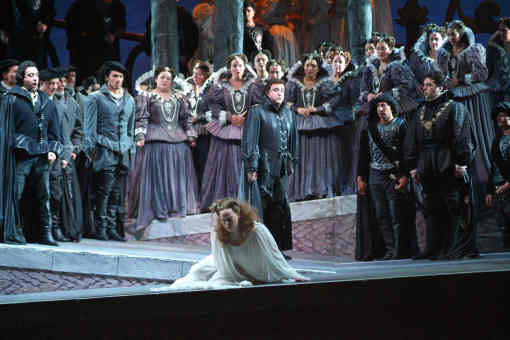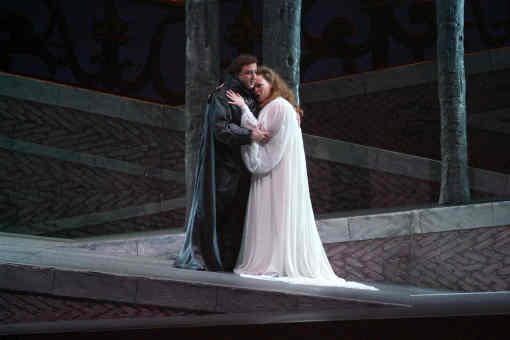Other Links
Editorial Board
-
Editor - Bill Kenny
-
Deputy Editor - Bob Briggs
Founder - Len Mullenger
Google Site Search
SEEN AND HEARD
INTERNATIONAL OPERA REVIEW
Bellini, I puritani:
co-production Opéra-Théâtre de Avignon et al, stage director Charles
Roubaud. Soloists, chorus and orchestra of Opéra Toulon Provence
Méditerranée, conductor Giuliano Carella. Toulon, France.
24.4.2009. (MM)
In recent operatic history there have been two sopranos who have set
two quite different standards for I puritani's Elvira --
la Callas and la Sutherland. Marseille's Il pirata
heroine Angeles Blancas Gulìn was in the Callas mold. In Toulon the
young Australian soprano Jessica Pratt proved to be distinctly in
the Sutherland mold -- a sumptuous voice, its richness extending
well into the stratosphere, a clean technique and lots of it, and
very well schooled. But there is little of the smolder and flash
that can bring a Bellini opera truly alive in spite of itself.

I
puritani
is Bellini's last opera, though he may not have thought so when he
wrote it, as just three months after its premiere he died at age 34
- early death a hazard of being a great Romantic. The libretto is
not by Felice Romani, Bellini's usual inspired collaborator, and
perhaps therein lies its problem. It arrives too easily and quickly
and not very gracefully at Bellini's formula of making "the audience
cry, shudder with horror and die singing.”
In his Puritani however the lovers do not die and the reason
why is far too simple - way offstage Cromwell has pardoned all
political prisoners, thus everyone lives happily ever after. This
is not a resolution that meshes comfortably with Bellini's dark and
troubled genius. Of course in I puritani operatic death
throes might have been excessive, as we had already had a soprano
mad scene that spread over three acts, and an extended exposition of
tenorial guilt reaching its peak on a high F.
In Toulon the real show is often in the pit as it was on the opening
night of I puritani. Conductor Giuliano Carella, Toulon's
music director, electrified Bellini's score with supercharged
passion that only sometimes may have been Bellini's. The effect was
two separate universes most of the evening, the suspended phrasing
pouring from the stage battling the dynamism of the pit. There were
sometimes convergences of stage and pit, and at these moments it
became almost sublime bel canto, and this happened when it
mattered most -- in the bulk of Elvira's second act madness,
Arturo's third act self torture, and certainly in Ricardo and
Walton's fiery Suoni la tromba when Mo. Carella got to do
what he does best - the thunder of early Verdi.

Rossini and Bellini's preferred tenor Giovanni Battista Rubini still
seems to be the standard for the role of Arturo against which all
other tenors are compared. This fabled tenor cannot have planted
the required high F (or whatever frequency that high note really
was) more firmly that did Georgian tenor Shalva Mukeria, or
delivered a more comfortably sung Corre a valle, corre a monte
or a more beautiful final duet with Elivra, replete with its two
thrilling unison high D's. Like Mme. Pratt, Mr. Mukeria is not
particularly comfortable on the stage.
The date and point of origin of metteur en scène Charles
Roubaud's well-traveled production was not given. Mr. Roubaud is an
accomplished minimalist, with several effective productions to his
credit at the huge Roman theater at Orange where minimalism is de
rigueur. While his style brings broad and simple solutions to
the daunting problems of staging bel canto, and here to
Bellini's dramatically naive Puritani, his bold ideas and
linear movements do not resonate with Bellini's limpid melodic
lines. As well this production imprisoned its singers on long
intersecting horizontal sloping platforms that created an upstage V
shape, depriving them of the use of the apron, and the opportunity
to simply sing in communion with the conductor and the audience, an
age-old trick that has saved many dramatically cumbersome, vocally
splendid operas.
The basic motif of stage decoration was herringbone brick
half-timbered walls, the tight geometry of the bricks and the
straight lines of the timbers again conflicted with the flowing
lyricism of the intoned text. At Orange big costumes in repetitive
shapes add detail, movement and color to a mostly empty stage, but
in Toulon such costumes on the large chorus simply crowded this
theater's relatively small mid-nineteenth century stage.
Completing the principal line-up was the Walton of Wojtek Smilek, an
accomplished Polish bass who will sing Szymanovski's King Roger
at the Bastille in June, and the Riccardo of Rodion Pogossov, a fine
Russian baritone who gave the most Italianate performance of the
evening.
Michael Milenski
Pictures ©
Frédéric Stephan
Back
to Top
Cumulative Index Page
